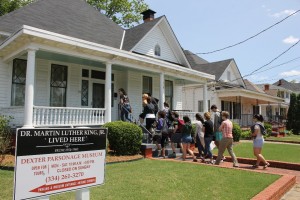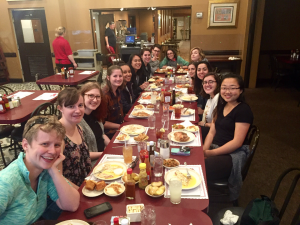On September 7, 1888, a mob of white men shot and killed seven unknown African Americans at their camp site meeting site near Screamer, Alabama. The lynching was reported as having begun over a white man’s drinking well. A group of African Americans were having camp meetings in the area, and they allegedly stopped at the well to drink some water. Newspaper reports stated that the white man who claimed ownership of the well approached, enraged. He ordered the African Americans not to drink from the well and even shot at one man as he was attempting to drink.
Later that night, the white man who claimed to own the well alleged that some of the African Americans had “threatened” him. A mob of white men formed, went to the African Americans’ camp and killed seven people. According to one news report, the mob “left seven bodies as a reminder to the other members of the camp meeting crowd.” (Equal Justice Initiative, In Remembrance: Lynching in Alabama, The Soil Collection Project)
Today, we packed into our cars and drove two hours down to Screamer, Alabama, a town so small and rural that it feels only like one abrupt, side-of-the-road stop off a long road through dense, sticky trees and hiccups of Baptist churches to the bottom right corner of Alabama.
We arrived at one such Baptist Church, parked, unloaded, put on our sunscreen, and split off– two us took one of seven ample, cool mason glass jar reading “Unknown #[1-7], Screamer, AL, September 7, 1888” and a brand new, bright red shovel. Emily and I took “Unknown #2” and made our way carefully through the thorny trees, initially unsure of which way to go; what was driving us? We paused and looked around. A few yards away, we spotted a small clearing, and then, a strong, cool tree. We squatted under the tree, and I felt nervous for as to what I should say. After a few quite moments, Emily finally spoke and said, “I’m sorry for what happened to you. I hope you find more peace in the afterlife than you had here.” We dug.
I’ve been bewildered by the level of responsibility and care the inspiring leaders here have entrusted to us here. This morning we visited Equal Justice Initiative in Montgomery for the second time, and listened to Bryan Stevenson, the founder of EJI and author of the 2014 New York Times Bestseller, Just Mercy, (among other fabulous titles) speak. He talked to us about these mason jars he was entrusting us with to pack full of Alabama soil moist with the sweat from slavery, the blood from broken, black bodies, the tears from the agony of segregation, and the life of hopeful truth and reconciliation.
By collecting soil from the sites of the 363 known lynchings that took place in Alabama, the Equal Justice Initiative hopes to make tangible and visible the often abstract and invisible lives that were taken through these acts of racial terrorism, a term that is new to me, and gives me chills. Bryan talked to us about how our American narrative equally makes invisible what is shameful and uncomfortable. We’ve heard several times now that there are 59 markers for Confederacy in Montgomery while only 3 for slavery and 0, yet, for lynchings.
How do we purport to move out without moving through spaces seeping with the legacy of a heavy history, of shadows that follow us?
We confront, we dig. We remember.
I was talking about time. It’s so hard for me to believe in it. Some things go. Some thing just stay. I used to think it was my rememory. You know. Some things you forget. Others thing you never do. But it’s not. Places, places are still there. If a house burns down, it’s gone, but the place– the picture of it– stays, and not just in my rememory, but out there, in the world… Right in the place where it happened. (Toni Morrison, Beloved)
Ana
 Many of the items within the home are from the time that the King family resided there and this is also the residence where an individual bombed the home during Rev. Martin Luther King, Jr.’s involvement with the Civil Rights Movement. Rev. Martin Luther King, Jr. is credited with stopping a violent riot from occurring the night of the bombing by telling the angry group of people who had gathered that his family was not hurt, to go silently, and to go home. We learned that in the kitchen of this home Rev. Martin Luther King, Jr. once contemplated the decision to end his involvement with being a part of the movement because of the threats on himself and his family. However, as we are all well aware, he made the choice that he wanted to continue in his calling towards righteousness, justice, and freedom for all people.
Many of the items within the home are from the time that the King family resided there and this is also the residence where an individual bombed the home during Rev. Martin Luther King, Jr.’s involvement with the Civil Rights Movement. Rev. Martin Luther King, Jr. is credited with stopping a violent riot from occurring the night of the bombing by telling the angry group of people who had gathered that his family was not hurt, to go silently, and to go home. We learned that in the kitchen of this home Rev. Martin Luther King, Jr. once contemplated the decision to end his involvement with being a part of the movement because of the threats on himself and his family. However, as we are all well aware, he made the choice that he wanted to continue in his calling towards righteousness, justice, and freedom for all people.